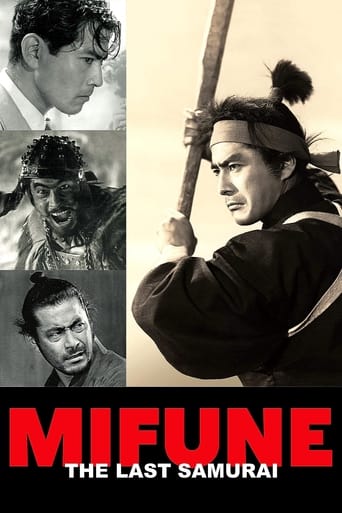

A Cliff Notes type look at the volcanic thespian that was Toshiro Mifune whose collaboration w/Akira Kurasawa rivals other actor/director relationships like Bogart/Huston & DeNiro/Scorsese. We get the usual boilerplate of timeline from his early days as an actor to the bullet points of film roles which defined his career. I wish the filmmaker delved deeper but as said in the doc, he was a very private man so what we have is a good entryway to this marvelous talent.
... View MoreIt is a good documentary on an actor that made a big impact in Japan and was important to the export and prominence of Japanese film worldwide, but is slowly being forgotten. With that said, I can only feel that the film had limited budget, research capability and focused only on a small sliver of who and what Toshiro Mifune was. The focus is on Toho and his work in chanbara films with Kurosawa. That is indeed his most important and notable period, but there is not much depth added even in those segments. As interesting as the subject matter is I would still say it is a good documentary where none other exist, but more relevant to those who know little about the actor.
... View MoreI'm sure I'm not the only one who was wondering why it is they couldn't get a hold of Tatsuya Nakadai. I feel that the approach they took with this documentary was a bit limiting. Given that "Samurai" is in the title it should come as no surprise that they, for the most part, really only talk about Mifune's roles as samurai in film. In a way it's both a documentary on Mifune and the chanbara genre as a whole. This is sort of a double edged sword for me. While I think it's valuable to provide background on the genre that Mifune is most famous for and which he in turn made popular outside of Japan, in the end it feels like you're sort of getting an incomplete picture of both him and the genre. The history lesson on the chanbara genre basically concludes with the introduction of Mifune and the history lesson on Mifune is more or less confined to his work in the chanbara genre. All things considered, for as much as I like this documentary and am a fan of what it features, I sort of wish it were two separate documentaries. One which covers chanbara, or perhaps just jidaigeki as a whole, and one which covers Mifune a bit more comprehensively. That might be a bit more satisfying as a whole. I'm sure any fan of Mifune could understand what I'm getting at. For anyone who wants to see a documentary on Mifune, there's going to be frustration that roles like he had in 'The Bad Sleep Well', 'High and Low' and 'I Live in Fear' are basically ignored. Likewise, any fan of the chanbara genre is undoubtedly going to feel a but cheated that Tatsuya Nakadai is never referred to at all, and that the history feels incomplete. I appreciate what this documentary is trying to do, and if you're a fan of Mifune, I would certainly recommend it. It could have been better though.
... View MoreWe owe a debt of gratitude to Steve Okazaki, an American film maker of Japanese ancestry, for recalling the magnetic Japanese film star Toshiro Mifune, who in collaboration principally but not exclusively with Akira Kurozawa, during 16 years of a frenetic, fecund period of Japanese cinema that left his indelible mark on world cinema. Okazaki cleverly kept his camera on Mifune as samurai, the last samurai, which is slightly misleading. The decline of rerun houses and Japanese film retrospectives may have dimmed the memory of an extraordinary actor. Mifune was an outsider, a fact few know. He was born in China, in Dalian. At 20, he first came to Japan for military service, not welcome but treated as second class. He kept his counsel, cultivated a quiet patience and persevered. In fact, an actor of the Golden Age of Japanese cinema, thought of only one word that defined Mifune: perseverance, a steadfastness ignoring difficulties in achieving success. Other actors spoke of his tenacity, his gambatte spirit, but also of his generosity and kindness. At first he had a limited vision of a career: a camera man, but Kurozawa saw something in him as an actor. And the rest, as they say is history. But Mifune's eyes, they had a hypnotic effect. They had a beam, a spark of something special, something god-like, if you will, that on screen the spectator knew he was in the presence of a talent that enchanted him. An actor whom his directors left alone to develop his character, and they were not wrong, for Mifune gave his all to his samurai and dramatic roles that so quickly resonated in his fans inner being. You only have to think of his peasant who wanted to become a warrior in 'Seven Samurai' or the gruff, quick thinking general in 'Hidden Fortress' or his wily 'Yojimbo' or his subtle portrayal in 'Red Beard',where without a sword he prevails. And then there's his portrayal of Kurozawa' adaptation of 'Macbeth', 'Throne of Blood' where real arrows were used to kill the usurper he portrays, and his costar Isusu Yamada as a spellbinding Noh like Lady Macbeth. Okazaki mentions but slights the broader acting skills of Mifune, with the great Takashi Imamura. Look again at 'High and Low', 'The Bad Sleep Well', 'Lower Depths' and the less great Kurozawa's version of Dostoevski's 'The Idiot' with the legendary Sestsko Hara. As the quintessential samurai, Mifune gained an international reputation and following. (What greater homage could be paid by Alain Delon in Melville's 'le samourai'). In later life, as head of a production company,he made and played endless endlessly the samurai. Never one to shirk responsibility, he brought his samurai into television as cinema waned. But age and the burden of keeping his emotions pent up, had its toll in heavy drinking and fast cars and scandal which broke up his marriage. And then alzheimer claimed him and he died at 77 in 1997. Now gone these almost 20 years, Okazaki brought him back to us and it is hoped to a younger generation of film enthusiasts who could do no better than to see Mifune's films.
... View More